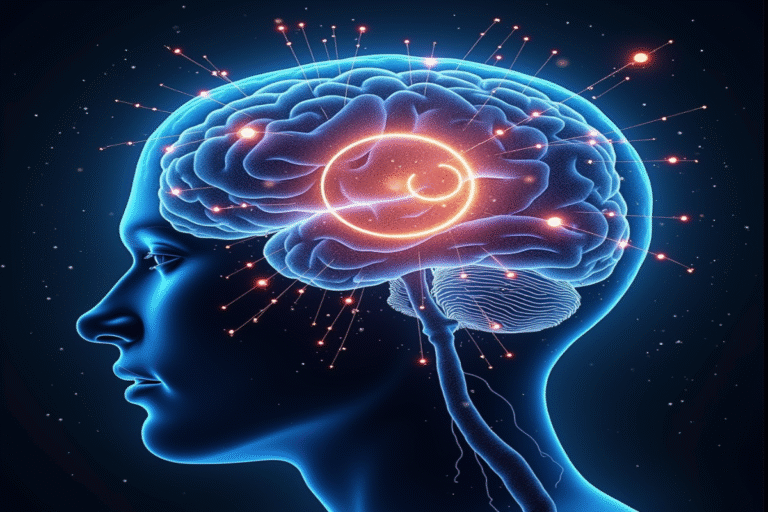Have you ever wondered how you instinctively know when a minute has passed without looking at your watch? Or how you can tell when music feels “off-beat”? Your brain performs these temporal feats constantly, yet there’s no single “clock” inside your head counting seconds. Instead, your brain uses a remarkable array of mechanisms to track time across different scales—from milliseconds to days—creating your perception of time’s passage.
The Neural Networks Behind Time Perception
Unlike other senses that have dedicated organs—eyes for vision, ears for hearing—time perception involves multiple brain regions working together. The basal ganglia, cerebellum, and prefrontal cortex form a complex network that processes temporal information. Researchers have discovered that instead of having a centralized timer, your brain uses distributed systems that engage differently depending on the timeframe being measured.
Neuroscientist Dean Buonomano of UCLA describes this as the “state-dependent network model” of timing—essentially, your neural circuits serve as timekeepers through their changing patterns of activity. Think of it as your brain creating time rather than simply measuring it.
Different Timescales, Different Mechanisms
Millisecond Timing: The Precision Performance
For extremely brief intervals (milliseconds to seconds), your cerebellum plays a crucial role. This is the timing that allows you to:
- Catch a falling object
- Play a musical instrument accurately
- Understand speech (which requires distinguishing sounds separated by just milliseconds)
This system operates largely unconsciously and with remarkable precision—you can detect timing differences as small as 10 milliseconds in some tasks.
Minutes to Hours: The Cognitive Clock
For longer intervals, your brain uses what scientists call the “internal clock model.” The prefrontal cortex and basal ganglia work together, with dopamine—a neurotransmitter associated with reward and motivation—playing a key role. This system helps you estimate how much time has passed during activities or to judge when a few minutes have elapsed without checking a clock.
Circadian Rhythms: Your 24-Hour Biological Clock
For day-length timing, your suprachiasmatic nucleus (SCN)—a tiny region in the hypothalamus—reigns supreme. This master circadian pacemaker coordinates your daily biological rhythms by responding to light cues from your eyes. It orchestrates everything from sleep-wake cycles to hormone release and body temperature fluctuations throughout the day.
Why Time Flies When You’re Having Fun
One of the most fascinating aspects of time perception is how subjective it can be. Research shows that attention dramatically impacts how we experience time’s passage:
When you’re deeply engaged in an enjoyable activity, your attention focuses on the task rather than on time itself. Your brain devotes fewer resources to temporal processing, making time seem to move faster. Conversely, when you’re bored or waiting anxiously, your attention keeps checking the time, making each moment feel longer and more noticeable.
This explains why an amazing vacation seems to fly by, while an uncomfortable medical procedure can feel endless, even though both last the same objective amount of time.
Altering Your Time Perception
Several factors can dramatically change how your brain processes time:
- Emotions: Fear can trigger a striking effect where time seems to slow down. During frightening events, your amygdala becomes more active, enhancing memory encoding. Later, these vivid memories seem to contain more detail, creating the illusion that time stretched during the experience.
- Body temperature: Studies show that increasing your body temperature can make time seem to speed up, while cooling it down can make time appear to slow.
- Age: The common feeling that time goes faster as we age may relate to proportional time—a year to a 5-year-old represents 20% of their life, while for a 50-year-old, it’s just 2%.
- Drugs: Substances like caffeine, psychedelics, and stimulants can profoundly alter time perception by changing neural firing patterns and neurotransmitter levels.
The Predictive Brain: Anticipating Time
Perhaps most impressively, your brain doesn’t just react to time—it predicts it. When you watch someone throw a ball, your brain calculates precisely when and where to position your hand to catch it. When you tap your foot to music, you’re not just reacting to beats but anticipating when the next one will arrive.
This predictive timing ability involves the cerebellum and basal ganglia creating temporal expectations, allowing you to synchronize with the world around you. Musicians and athletes develop especially refined versions of this predictive timing through practice.
Time Without Awareness
Amazingly, your brain tracks time even when you’re not conscious of it. Research with patients in minimally conscious states shows they still maintain some timing abilities. Even during sleep, your circadian system continues its timekeeping functions.
This reveals something profound: time perception may be fundamental to how our brains organize experience, working beneath conscious awareness.
The Future of Time Research
Scientists continue to uncover new aspects of neural timekeeping. Recent research using brain imaging techniques shows that patterns of neural activity can actually predict how much time a person perceives has passed—essentially “reading out” subjective time from brain activity.
Understanding these mechanisms could help develop treatments for conditions with disrupted timing, from Parkinson’s disease to certain forms of dyslexia where temporal processing is impaired.
The next time you check your watch, remember—your brain has already been keeping track all along, using an elegant symphony of neural processes to create your personal experience of time’s passage. No batteries required.





